![]()
![]()
![]()
Use LEFT and RIGHT arrow keys to navigate between flashcards;
Use UP and DOWN arrow keys to flip the card;
H to show hint;
A reads text to speech;
70 Cards in this Set
- Front
- Back
|
Oligarchy |
small group of people having control, organization, or institution |
|
|
Patricians |
an aristocrat or nobleman |
|
|
Senate |
Political institution in ancient Rome. Not an elected body, members were appointed by consuls. |
|
|
Consul |
Highest elected political office of Roman Republic. Each year, two of these were elected together to serve for a one year term. |
|
|
Plebian |
Commoner, member of lower social class. |
|
|
Tribunes |
Officer of Roman army who ranked below the legate but above centurion. Considered a stepping stone into the Senate. |
|
|
Justinian |
Reigned 527 to 535. Byzantine Emperor. |
|
|
Punic Wars |
264 to 146 BCE. Series of three wars fought between the Romans and Carthage. The first war broke out because Rome interfered with Sicily. The second war was started when Carthage invaded Italy. The third war, Carthage was destroyed by the Romans. |
|
|
Julius Caesar |
Roman statesman, general and notable author of Latin prose. Played a critical role in the events that led to the demise of the Roman Republic. Born 100 BCE, assassinated 44 BCE. |
|
|
Augustus Caesar / Octavian |
Founder of the Roman Empire, first Emperor. Born into a wealthy equestrian branch of a plebian family, was adopted and eventually named as a ruler. Born 63 BCE, died 14 AD. |
|
|
Mark Antony |
Roman politician and general who played a critical role in the transformation of Roman Republic from an oligarchy into the autocratic Roman Empire. |
|
|
"Bread and Circuses" |
A phrase used by a Roman writer to deplore the declining heroism of Romans after the Roman Republic ceased to exist and the Roman Empire began. The government kept the Roman populace happy by distributing free food and staging huge spectacles. |
|
|
Spartacus |
Thracian gladiator who was one of the escaped slaved leaders in the Third Servile War - a major slave uprising in the Roman Republic. |
|
|
Cicero |
Roman philosopher, politician, lawyer, orator, political theorist, consul and constitutionalist |
|
|
Ovid |
Roman poet who lived during the reign of Augustus. He was a contemporary of Virgil and Horace. |
|
|
Jesus |
Central figure of Christianity, whom the teachings of most Christian denominations hold to be the Son of God. |
|
|
Pontius Pilate |
Fifth prefect of the Roman province of Judaea from AD 26–36. He served under Emperor Tiberius, and is best known from the biblical account of the trial and crucifixion of Jesus. |
|
|
Tiberius |
Roman Emperor from 14 AD to 37 AD. |
|
|
Paul |
Converted to Christianity, taught the gospel of Christ in the first-century world. Generally considered one of the most important figures in the Apostolic Age. |
|
|
Heterodoxy |
Opinions or doctrines at variance with an official or orthodox position. |
|
|
Heresy |
Belief or opinion contrary to orthodox. |
|
|
Orthodoxy |
Accepted beliefs or opinions in religion. |
|
|
Gnosticism (gnosis) |
Belief in that knowledge brings salvation. Jesus is the keeper of the knowledge. All earthly matter is evil. |
|
|
Apologist |
Defenders of the orthodoxy. Writers who interpret the scriptures. |
|
|
Nicene Creed |
Profession of faith in Christianity, adopted from the First Council of Nicaea in 325. |
|
|
Diocletian |
Roman emperor from 284 to 305. Born to a family of low status in the Roman province of Dalmatia, rose through the ranks of the military to become cavalry commander to the Emperor. |
|
|
Constantine |
Roman Emperor from 306 to 337 AD. Son of Flavius Valerius Constantius, a Roman army officer, and his consort Helena |
|
|
Irenaus of Lyons |
Bishop of Lugdunum in Gaul, then a part of the Roman Empire. He was an early Church Father and apologist, and his writings were formative in the early development of Christian theology |
|
|
Tertullian |
A prolific early Christian author from Carthage in the Roman province of Africa. |
|
|
Origen |
Scholar and early Christian theologian. Born and spent the first half of his career in Alexandria. Prolific writer in theology. Some of his teachings contradicted the teachings of some Apostles. |
|
|
Arianism |
An influential heresy denying the divinity of Christ, originating with the Alexandrian priest Arius ( circa 250– circa 336). Maintained that the Son of God was created by the Father and was therefore neither co-eternal with the Father, nor con-substantial. |
|
|
Jerome |
Wrote a book that got into the Bible or something, yo' |
|
|
Manicheanism |
Major religion that was founded by the Iranian prophet Mani |
|
|
Pentateuch |
The central reference of the religious Judaic tradition. It has a range of meanings. |
|
|
Rosh Hashanah |
Occurs on the first and second days of Tishri. In Hebrew, means, literally, "head of the year" or "first of the year." Commonly known as the Jewish New Year. |
|
|
Yom Kippur |
Also known as Day of Atonement, is the holiest day of the year in Judaism. |
|
|
Septuagint |
Translation of the Hebrew Bible and some related texts into Koine Greek. As the primary Greek translation of the Old Testament, it is also called the Greek Old Testament. |
|
|
Philo of Alexandria |
Hellenistic Jewish philosopher who lived in Alexandria, in the Roman province of Egypt. Used philosophical allegory to attempt to fuse and harmonize Greek philosophy with Jewish philosophy. |
|
|
Antiochus Epiphanes |
King of the Hellenistic Seleucid Empire from 175 BCE until his death in 164 BCE |
|
|
Judas Maccabeus |
Jewish priest and a son of the priest Mattathias. He led the Maccabean Revolt against the Seleucid Empire. |
|
|
Hanukkah |
Jewish festival, lasting eight days from the 25th day of Kislev (in December) and commemorating the rededication of the Temple in 165 BC by the Maccabees after its desecration by the Syrians. It is marked by the successive kindling of eight lights. |
|
|
Sadducees |
Member of a Jewish sect or party of the time of Jesus Christ that denied the resurrection of the dead, the existence of spirits, and the obligation of oral tradition, emphasizing acceptance of the written Law alone. |
|
|
Pharisees |
School of thought in the Holy Land during the time of Second Temple Judaism. Essentially, they were Jewish philosophers. |
|
|
Essenes |
Sect of STJ that flourished from the 2nd century BCE to the 1st century CE. |
|
|
Zealots |
Member of an ancient Jewish sect aiming at a world Jewish theocracy and resisting the Romans until AD 70. |
|
|
Five Pillars of Islam |
Five basic acts in Islam, considered mandatory by believers and are the foundation of Muslim life. They are summarized in the famous hadith of Gabriel. |
|
|
Muhammad |
Regarded by non-Muslims to have been the founder of Islam, and almost universally considered by Muslims to have been the last prophet sent by God to mankind to restore Islam. |
|
|
Mecca |
Islam’s holiest city |
|
|
Gabrial (Jibrail) |
An angel who typically serves as a messenger sent from God to certain people. |
|
|
"Hegira" |
Muhammad's departure from Mecca to Medina in AD 622, prompted by the opposition of the merchants of Mecca and marking the consolidation of the first Muslim community. |
|
|
Caliph |
Person considered a political and religious successor to the Islamic prophet, Muhammad (Muḥammad ibn ʿAbdullāh), and a leader of the entire Muslim community. |
|
|
Abu-Bakr |
Was a senior companion and the father-in-law of the Islamic prophet Muhammad. |
|
|
Uthman |
Was a companion of the Islamic prophet Muhammad, and the third of the Sunni Rashidun or "Rightly Guided Caliphs". |
|
|
Jihad |
An Islamic term referring to the religious duty of Muslims to maintain the religion. |
|
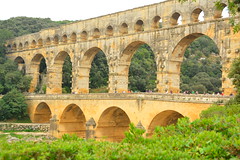
|
Pont du Gard, aquaduct at Nimes, France (96 BCE) |
|
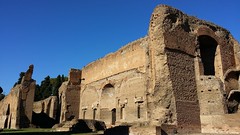
|
Baths of Caracalla, 211 CE |
|
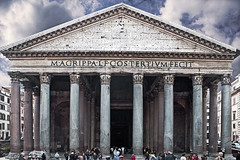
|
Pantheon, 117-125 CE |
|
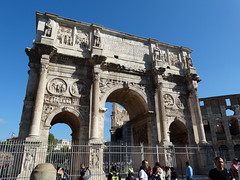
|
Arch of Constantine, 312-315 CE |
|
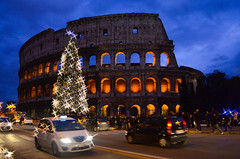
|
Colosseum, 72-80 CE |
|
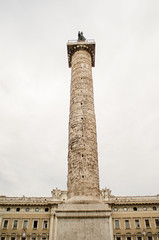
|
Trajan's Column, 106-113 CE |
|

|
Augustus as Pontifex Maximus |
|
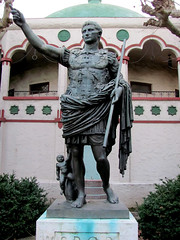
|
Augustus Primaporta |
|
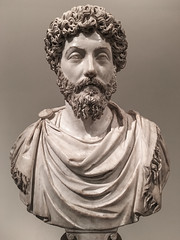
|
Marcus Aurelius, 165 CE |
|
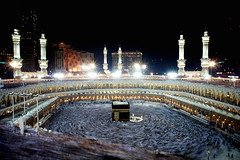
|
Kaaba |
|
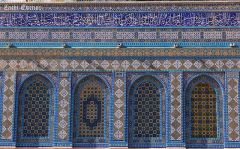
|
arabesque at the dome of the rock |
|
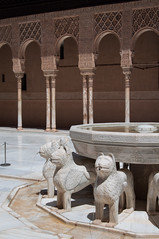
|
Court of the Lions, The Alhambra, Spain (1300s) |
|
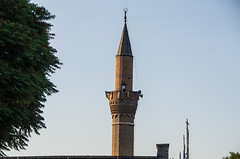
Minaret |
A tall slender tower, typically part of a mosque, with a balcony from which a muezzin calls Muslims to prayer. |
|

Mihrab |
a niche in the wall of a mosque, at the point nearest to Mecca, toward which the congregation faces to pray. |
|
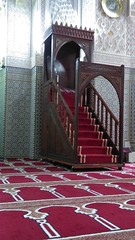
Minbar |
A short flight of steps used as a platform by a preacher in a mosque. |
|

|
Great Mosque of Samarra, Iraq (848-852) |

